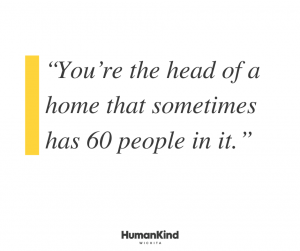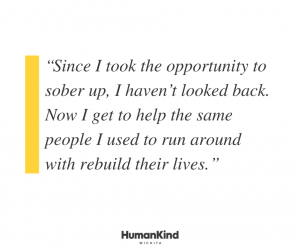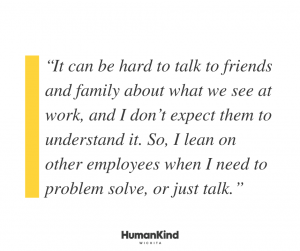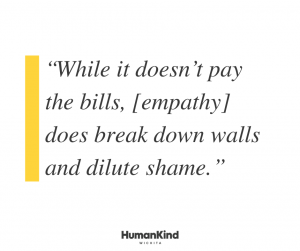What You Probably Don’t Know About HumanKind House and Case Managers
Disclaimer: HumanKind works with official mental health and substance abuse organizations to get clients the help they need. HumanKind House and Case Managers are not licensed medical or therapy providers. When you donate to HumanKind, you know you’re supporting programs that provide basic needs to Wichita’s homeless residents. While things like shelter, food, and showers are easy to picture, some of the most basic needs your donations fund come from HumanKind employees. House and Case Managers are the unsung heroes of HumanKind. Their superpower? Empathy.
When you donate to HumanKind, you know you’re supporting programs that provide basic needs to Wichita’s homeless residents. While things like shelter, food, and showers are easy to picture, some of the most basic needs your donations fund come from HumanKind employees. House and Case Managers are the unsung heroes of HumanKind. Their superpower? Empathy.
Like most valuable things in life, empathy takes work. Some are blessed with it and some have to choose it. House Manager Jason Coady urges society to choose it:
“Look at the bigger picture. When you see a homeless person on the street, what you don’t see is how they got there.”
The same can be said for House and Case Managers themselves—they experience things in a regular day at work that many of us will never see. Some have walked the path of homelessness themselves. What bonds them all together is a shared determination to pay things forward.
Between them, Jason, Ashton Hinckley, and Cheryl Young provide House Management across all of HumanKind’s shelters—Cheryl also works one on one with clients as a Case Manager to help them manage or rebuild their lives. Over the years, these three have seen and done a lot. And while the title “Manager” might invoke images of sitting behind a desk, it couldn’t be much farther from the truth for them.
House Managers Manage A Lot More Than Houses
While a House Manager’s job is quite literally to manage the house and its residents, “Head of Household” might be a more fitting job title. Cheryl describes it beautifully: “You’re the head of a home, so you do all the things that go into running a home.” But unlike in a traditional home, alongside the cooking, cleaning, and laundry, there’s a good amount of admin thrown in: meal sign-ups, meal tracking, laundry tracking, shower tracking, and health checks, for example, as well as daily reports for each client.
Being the head of a home also means safeguarding the wellbeing of everyone in it, so House and Case Managers have to balance individual client’s needs with what’s best for the home as a whole. Jason explained that, “It can be hard sometimes to strike the balance between doing what’s right for the house and what’s right for one person. A lot of clients don’t need strict rules, but for consistency and safety we have to hold everyone to the same standard.”
For most of us, heading up such a large household would be overwhelming, but Cheryl is driven by it and sees it as her responsibility to inspire and energize her clients:
“It starts with us. You set the energy for the room when you come to work. If you come in in a bad mood you set the whole house up for failure.”
Beyond the basic needs of shelter, laundry, and food are support, guidance, and people you can trust—things humans need in order to thrive. Sometimes a House or Case Manager is the only person that fulfils those needs for HumanKind clients. The relationships they form with them are often a key part of their recovery:
“Sometimes the only thing they own is themselves. It’s our job to remind them that they are enough. That means being on their team as a therapist, counselor, teacher, friend.”
—Cheryl
House and Case Managers Often Have Very Personal Reasons for Doing Their Jobs (and They Rarely Leave Work at Work)
When your job directly impacts people in such personal ways, boundaries are difficult to put in place and hard to keep. So when asked “How do you leave work at work?”, the answer was unsurprisingly unanimous—they don’t. House and Case Managers rarely “fall” into their profession—they are often driven by a passion and purpose. Just like human needs, those things don’t stop at 5pm.
The plights of HumanKind clients are often intrinsic to employees’ lives outside of work because, in some cases, they always have been. Five- and ten-years sober respectively, Jason and Cheryl share a perspective that helps them identify with and inspire many clients:
“I used to be just like the clients, in fact I used to be a client—my boss used to be my caseworker! I’ve suffered addiction, I’ve been incarcerated, and I’ve thrown away opportunities, but since I took the opportunity to sober up, I haven’t looked back. Now I get to help the same people I used to run around with rebuild their lives. I decided years ago to have patience and if I help even one person turn their life around. It’s worth it.”
—Jason
Cheryl also identifies with the complex struggles at the center of many clients’ lives. She is driven by a determination to honor her late son, whom she lost to addiction.
“I was in the system as a child and that’s partly why I worked with juveniles for 17 years. I’m also no stranger to addiction, so I know what some of our clients face every day. I’m winning my battle with addiction, but my son lost his, so if I can help someone else win theirs, you can be sure I will.”
—Cheryl
There is a common misconception that all homelessness is a result of substance abuse or unchecked mental health. While those issues are sadly prevalent, often the opposite is true — homelessness is a known factor in the cause of those issues, not a result. Part of a House or Case Managers’ job is to recognize them:
“Right now, I’m doing a lot of personal research into mental health and addiction. Having an understanding of those things is critical to serving our clients that suffer with them.”
—Ashton
Cheryl concurs: “Everybody assumes homeless people are addicts. And some are, but addicts don’t deserve to be underserved. You’re never going to serve those clients wholly without getting to the core of that yourself.”
House and Case Managers Lean On Each Other A Lot
Working with the homeless population automatically signs you up to a very special club. Whether you’ve been a member for 2 weeks or 20 years, it’s challenging, emotionally demanding, and frankly, a lot of it would take its toll if employees didn’t have each other. On top of the demands of the work itself, they also balance long hours, night shifts and multiple locations. This lifestyle is hard to identify with if you’re not living it:
“It can be hard to talk to friends and family about what we see at work, and I don’t expect them to understand it. So, I lean on other employees when I need to problem solve, or just talk. They also give me other perspectives to consider. I like that I can do that for them when they need it too.”
—Ashton
House Managers believe that one of the keys to successfully running a home for dozens of people is to behave like a family:
“It’s a home at the end of the day. So we try to make each other’s lives easy. If I know Jason’s going to be in work tomorrow cooking all day, I’ll make sure there’s a meal for him ready to go.”
—Cheryl
Healing Starts with Empathy
Working with those experiencing homelessness is not for everyone. The common thread of empathy that runs between all of our House and Case Managers helps them see their clients in a way not enough people do.
Whether it’s by identifying directly, educating themselves, or pre-empting what each other needs, they exhibit some of the purest examples of empathy you will ever find. Some days that’s what clients need the most:
“I lead with empathy. And while it doesn’t pay the bills, it does break down walls and dilute shame which is something many of our clients carry unnecessarily.”
—Cheryl
Ashton elaborates: “Everybody’s story is very different. Some of them are very sad and they’re rarely what you think. I work with ladies who have found themselves homeless and thousands of miles from home because of two or three strokes of horrible luck—women who have lost jobs and husbands and now have nothing. Just take a walk in their shoes.”
And Cheryl concludes: “The array of reasons for homelessness is too big a picture to grasp. If you’re not ready to form relationships with people and learn theirs, you’re not going to do this job well.”
HumanKind House and Case Managers are special people. In the midst of a global pandemic, they put themselves at risk to keep our community safe. They choose to lean on their own experiences to pull people out of the river. And, without seeking recognition or reward, every day they choose kindness.










